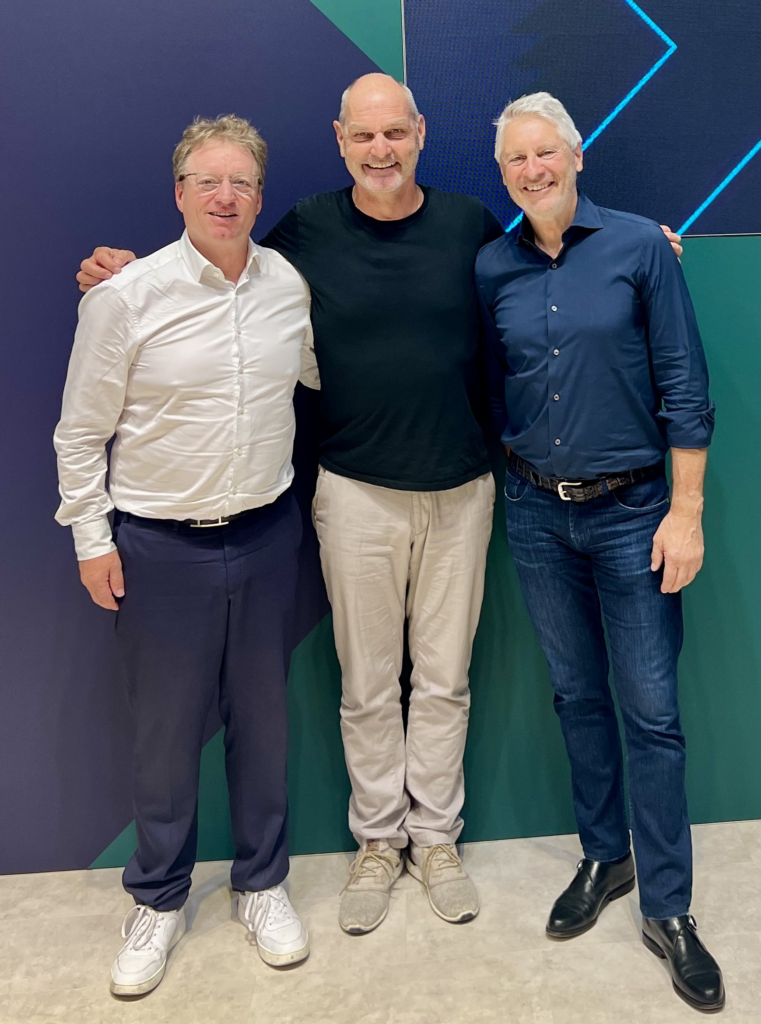- Storage specialists join forces to accelerate large-scale battery projects and the energy transition
- The planned storage facilities will reduce CO2 emissions because renewable energies will be better utilized and fewer gas and coal-fired power plants will be needed
- With their combined project planning, marketing and financing expertise, the partners aim to build up to eight gigawatts of storage capacity
Pullach/Zurich, June 26. GESI Giga Batteries and The Mobility House founded a joint venture this week to develop, finance and market large-scale battery storage systems. “The Mobility House is an ideal partner for our storage projects, with which we want to accelerate the energy transition and save millions of tons of CO2,” says GESI Chairman and CEO Walter Raizner. The company has great expertise when it comes to integrating storage systems into the electricity grid and marketing the energy.
“Combining our operational expertise with the marketing performance of The Mobility House is a strategic milestone on the way to gaining significant market share,” comments COO Jens Michael Wegmann.
The Mobility House has more than 56,000 customers worldwide and has been a pioneer in the marketing of stationary 1st and 2nd life car batteries since 2016. The company has just won “The smarter E” award for its technology because it is the only marketer with many years of experience in the ageing of batteries.
“Our collaboration with GESI Giga Batteries is another step towards our vision of a zero-emission future,” says The Mobility House founder and CEO Thomas Raffeiner. “With the planned gigawatt-scale storage systems, we are making a significant contribution to the energy transition. Our expertise complements each other perfectly here: industry know-how and financial strength meet many years of experience in the marketing of battery storage systems.”
Large batteries: “by far the most efficient solution”
The joint venture partners now want to push ahead with projects with storage capacities of between 100 and 1000 megawatts (MW) and build a total of up to eight gigawatts (GW) of storage capacity by 2035. For comparison: 1 GW is enough for 400,000 households. Preparations for the first project are well advanced: a large-scale battery with an initial storage capacity of 250 MW is in the concrete planning stage. A further 500 MW are to be added in the second expansion phase.
Large-scale stationary storage systems are indispensable for the energy transition because enormous electricity reserves are needed to compensate for fluctuations in solar and wind power. Around 70 percent of the reserve requirement is accounted for by storage periods of up to 1.5 days – and large batteries are “by far the most efficient solution”, says COO Wegmann.
At present, the generation of solar and wind energy often has to be throttled or stopped due to a lack of storage. In 2023 alone, electricity worth 3.1 billion euros was lost as a result. The GESI large-scale batteries help to prevent such expensive curtailments and make optimum use of the renewable energy potential. In addition, CO2 emissions are falling because fewer fossil gas and coal-fired power plants are needed.
Walter Raizner and Jens Wegmann will be happy to answer any questions you may have.
Contact:
GESI Green Energy Storage Initiative SE
Zugspitzstrasse 15
82049 Pullach i. Isartal
info@gesi-deutschland.de

Photo: GESI board members Jens Wegmann (left) and Walter Raizner (right) with The Mobilty House founder Thomas Raffeiner
About GESI Giga Batteries
GESI SE develops, plans, builds and finances efficient, digitized large-scale battery storage systems to accelerate the energy transition. Walter Raizner (Chairman & CEO, ex-COO of IBM Technology Group, former Telekom board member) and Jens Michael Wegmann (COO, most recently S-Dax board member at kloeckner & Co. SE and former CEO of Siemens Industrial Solutions) will manage the operational business. Other members of the Board of Directors are family entrepreneur Martin A. Schoeller, the former BCG Chairman for the DACH region and Asia Dr. Peter Strüven and the long-standing Munich Re CEO Dr. Nikolaus von Bomhard. For further information: https://gesi-deutschland.de/
About The Mobility House
Shaping an emission-free energy and mobility future – that is the goal of The Mobility House. Our technology connects the automotive and energy sectors. We integrate vehicle batteries into the power grid using intelligent charging and energy solutions. In this way, we are promoting the expansion of renewable energies, stabilizing the electricity grid and making electromobility more affordable.
The technology company was founded in 2009 and operates worldwide from offices in Zurich, Munich, Paris, Singapore and Belmont (CA). We support our private and business customers in their entry into electromobility by planning, setting up and operating an individual charging infrastructure. As a neutral provider, we work together with many partners such as charging infrastructure manufacturers, installation companies, backend systems, energy suppliers and car manufacturers. Our self-developed FlexibilityAggregator forms the technological foundation for our intelligent charging and energy management system ChargePilot and eyond, a smart car electricity tariff that makes charging affordable and stabilizes the electricity grids and markets at the same time. For further information: www.mobilityhouse.com.

